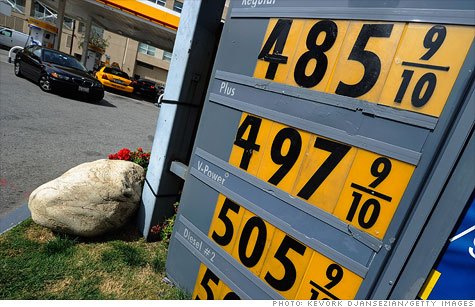NEW YORK (CNNMoney) — The nationwide average for gasoline prices eased Tuesday, marking the first decline after 27 straight days of increases, according to the motorist group AAA.
The average price of regular unleaded gasoline fell three-tenths of a cent to just above $3.76 a gallon, AAA said.
The nationwide average was $3.48 a gallon a month ago and $3.72 a week ago. Last year at this time, the average price stood at $3.51 a gallon.
The average price is 35 cents, or about 8.5%, lower than the record high of $4.11 on July 17, 2008.
Average prices for regular gasoline top $4 a gallon in California, Alaska and Hawaii. At $4.38 a gallon, Hawaii ranks as the nation’s high. Prices are within a few cents of the $4 mark in Connecticut, Oregon and New York, according to AAA.
Wyoming has the nation’s lowest gas prices, averaging $3.23 a gallon.
Check gas prices in your state
Gas prices have been rising on the back of soaring oil prices, which have surged 10% over the past month amid fears that tensions with Iranwill lead to an all-out war that causes a disruption in oil supplies.
Signs of an improving economy have also boosted oil prices, as has thestock market. All three major indexes hit multi-year highs in the past week, but have finished in the red for the past two trading days.
As the Republican primaries hit full throttle on Super Tuesday, the candidates have used gas prices to attack their opponents as well as President Obama.
On Sunday’s morning talk shows, Newt Gingrich said that that rising gas costs would provide a surge to his candidacy, as he has pledged to get prices down to $2.50 a gallon.
“The price of gasoline is becoming a genuine crisis for many American families,” he told CNN’s Candy Crowley, saying it would be a “pretty big burden” for Obama come November.
Meanwhile, speaking in Georgia, Mitt Romney refused to promise a lower gas price like his rival.
“I’m not gonna come here and pander to you and say here’s what your gasoline price will be if I do all those things,” Romney told the Atlanta audience.
Last week, Gingrich accused Obama of slowing domestic production and contributing to high prices. Romney, meanwhile, advocates opening federal lands to drilling and easing regulations on fracking — a controversial policy that involves pumping water into rocks to harvest gas.
In a speech last week in New Hampshire, Obama stressed that domestic oil and gas production is at its highest point since 2003, and that the United States has more working oil and gas rigs than the rest of the world combined. But he also emphasized the need to develop new energy sources, as domestic production alone is not enough to keep up with U.S. demand. ![]()



You must log in to post a comment.